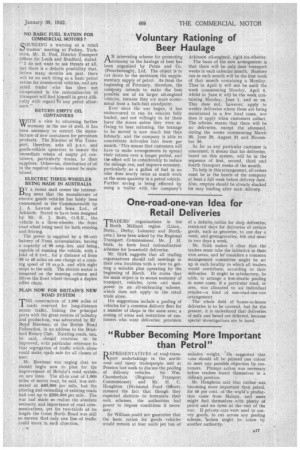Voluntary Rationing of Beer Haulage
Page 19

If you've noticed an error in this article please click here to report it so we can fix it.
AN interesting scheme for promoting economy in the haulage of beer has been organized by Paten and Co. (Peterborough), Ltd. The object is to cut down to the minimum the supplementary supply of petrol. As from the beginning of February, therefore, the company intends to make the best possible use of its larger oil-engined vehicles, because they are more economical front a bulk-fuel standpoint.
Ever since the war began, it has endeavoured to run its vehicles fully loaded, and not willingly to let them leave the stores unless they were so. Owing to beer rationing, the tonnage to be moved is now much less than foi-merly, and the company is able to concentrate deliveries into fewer per month. This means that customers will have to make arrangements to spread their rations over a longer period, and the effect will be considerably to reduce the mileage run, and improve economy, particularly as a gallon of fuel in an oiler does nearly twice as much work as the same quantity in a petrol vehicle. Further saving is being effected by using a trailer with the company's Atkinson oil-engined, rigid, six-wheeler.
The basis of the new arrangement is that there will be only lour transport weeks in each calendar month. Number one in each month will be the first week of that month containing a Monday. Thus in April it will not be until the week commencing Monday, April 6, whilst in June it will be the week containing Monday, • June 1, and so on. This does not, however, apply to weekly deliveries where these are being maintained in a few local cases, nor does it apply when customers collect. The scheme means tha,t there will be no deliveries, except the aforesaid, during the weeks commencing March 30, June 29, August 31 and November 30.
So far as any particular customer is concerned, it means that his deliveries, based on this system, will be in the sequence of first, second, third and fourth transport weeks of the month.
To help in this arrangement, all orders must be in the hands of the company at least a full week before delivery date. Also, empties should be already stacked foe easy loading after each delivery.




















































